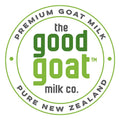Why Goat Milk is a Better Choice than Plant-Based “Milks”

It’s true that there are several big reasons to choose goat milk, even if you do not suffer from cow milk-induced allergic reactions or lactose intolerance. For one, goat’s milk contains a denser concentration of vitamins and minerals, making it a healthy choice.
But what if you do suffer from lactose intolerance and must find a suitable milk replacement?
In an earlier post here on the blog, we compared different animal-provided dairy milk to examine how goat milk is the best option for those with lactose digestion difficulties. (Important note: you should always consult with your physician before exploring new milk alternatives—goat milk and others are not right for every individual with lactose intolerance.)
Confusingly, however, there are also many lactose-friendly fluid beverage options on the market today calling themselves “milk,” but they do not come from animals. These drinks are instead blended from various plants and nuts, like soy, rice, and almonds. And this means their nutritional profiles can be very different from that of a true milk product, especially if they are not separately fortified.
Today, we are delving into how some of these other most popular and commercially available brands of lactose-friendly or lactose-free beverage options stack up to goat milk, and why you should carefully consider using any given product as a full replacement for cow’s milk to assure you’re receiving the nutrition you expect.
Goat Milk Nutrition is Unbeatable
The main reason to choose goat milk over other lactose-friendly choices has to do with nutrition. No individual plant “milk” product can match goat milk on nutritional content across the board. In fact, cow’s milk can’t match goat milk either! With fewer calories per serving and less sodium and cholesterol, plus higher values of certain B vitamins, vitamin C, copper, manganese, and more, goat milk is a nutritional powerhouse. (We also think goat milk tastes better, too, but realize that’s a matter of personal preference.)
Just check out this comparison chart between goat and cow’s milk along with several of the most popular plant-based, lactose-friendly beverages.

How Goat Milk Compares to Plant-Based Milks
We took a look at the nutritional profiles of some of the most widely available brands (Silk, Blue Diamond, Rice Dream, etc.) of plant-based “milk” beverages in comparison to our New Zealand Natural Full Cream Powdered Goat Milk products. What we found was wildly differing nutrition facts for some brands versus others. It’s important to remember that vitamin and mineral fortification can improve a given product’s nutrition, so reading labels when shopping milk alternatives is crucial.
Our comparisons here are generalizations and your favorite product may differ.
Almond Milk
With an excellent calcium content of 45% of your recommended daily value (based on a 2,000 calorie diet in the USA) or about 444 mg per serving when properly fortified, almond milk can look great compared to both cow and goat milk. Unfortunately, that’s not the entire story. Your typical cup of unsweetened almond milk has just one lonely gram of protein. It also has no vitamin C (putting it on par with cow milk, but significantly behind goat milk). What it does have is an elevated sodium content compared to cow and goat milk—178 mg vs. 120 mg and 115 mg per serving, respectively. And remember, if you have a nut allergy, almond milk may not be suitable for you.
Cashew Milk
As you might expect, cashew milk and almond milk are very nutritionally similar. When choosing one over the other, it’s usually a matter of taste. Cashews have an earthier flavor than almonds, and that comes through in the finished beverage product, especially if it is unsweetened. Cashew milk is a little bit lower in calories and fat than almond milk, but it’s also low in protein like almond milk with just that single gram, unless is has been specially fortified not all brands are. Again, if you have a nut allergy, you will likely need to avoid cashew milk.
Coconut Milk
Looking for protein? Coconut milk has little to none! While it contains healthy B vitamins and is very low in sodium, too, most people expect protein from milk and coconuts just can’t deliver. Plus, coconut is naturally higher in saturated fat and has a distinctive flavor that not everyone likes. The good news here is that Americans are typically less allergic to coconuts than tree nuts like almonds and cashews, so coconut milk may be of interest if you are lactose intolerant and have a nut allergy. (Though we think goat milk is certainly worth a try, especially if you don’t enjoy coconut flavor, but want something a little sweet. Our New Zealand Natural Full Cream Goat Milk Powder with Manuka Honey may be just what you’re looking for!)
Soy Milk
While a serving of soy milk contains an impressive 7 grams of protein, it has relatively few vitamins and nutrients that even other plant-based “milks” do, though it is a decent source of potassium and vitamin A. When fortified with calcium and vitamin D, soy milk may come close to being a true milk substitute, but there are a few other problems with soy. First, soy is a common allergy in both adults and children. Second, research suggests that soy may be a problem for people with thyroid conditions. It may also cause fertility problems in humans. These potential health risks lead many to avoid soy in their diets, and you may want to reconsider soy yourself based on these facts.
Rice Milk
Containing 25% of the recommended daily amount of vitamin D (when properly fortified) and being the least likely plant-based “milk” beverage to cause an allergic reaction, rice milk seems like a winner at first. Unfortunately, it’s very high in sugar (with about 10-13 grams in an 8-ounce glass depending on the brand and formulation) without being very high in protein to make up for it, as true dairy milks are. Rice milk may be unsuitable for individuals with diabetes due to its carbohydrate content, in fact. And it has been suggested by the FDA to not make rice milk your sole milk replacement, as consuming too much may expose people to high levels of inorganic arsenic.
Your Best Cow’s Milk Replacement – Goat Milk
As we’ve shown, goat milk has so many excellent qualities that make it a fantastic alternative to conventional cow’s milk—and to plant-based milk substitutes. Here at the Good Goat Milk Company, our premium goat milk powder products also bring extreme convenience to the table. Worried about not liking the flavor of goat milk? We find that many folks who have yet to try goat milk are a little concerned they will not like it, which is why we published a blog post all about what goat milk tastes like! While the only real way to discover whether you enjoy the mild, creamy flavor of goat milk is to try it, we believe the more information you have to make a decision, the better. We invite you to contact us with all of your goat milk questions and feedback. Or simply shop now on our website or Amazon.
